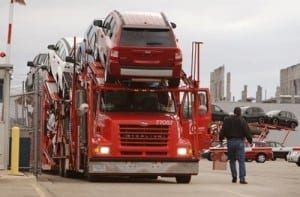Why Household Items Are Not Allowed in Your Vehicle During Transport
 If you’ve been a follower of our website or you’ve read articles and blogs on here before, chances are you’ve seen a post or two about the concept of “junk in the trunk” and how it’s slang for “stuff in the trunk of a car that really, technically shouldn’t be there but we’re gonna let it slide.”
If you’ve been a follower of our website or you’ve read articles and blogs on here before, chances are you’ve seen a post or two about the concept of “junk in the trunk” and how it’s slang for “stuff in the trunk of a car that really, technically shouldn’t be there but we’re gonna let it slide.”
There are, however, rules, and – perhaps more importantly – reasoning behind those rules. In this blog post, we’ll discuss some of the rules and regulations that govern the shipping of household items in a vehicle on an auto transport truck that you probably either don’t know much about or have never heard of.
So follow along as we explain why household items are not allowed in your vehicle during transport.
1. Auto transporters are not licensed to transport any household goods
This is kind of rule #1. It’s kind of a big rule, too.
See, long-haul commercial drivers have to be licensed in several ways. For starters, they have to be licensed commercially and have a CDL in order to actually drive their truck.
Then, whatever company they’re hauling for (even if they own the truck outright) has to be licensed to transport goods in a specific sector (i.e. meats, dairy products, live poultry, cars, etc), and they need a license from every sector they transport goods within.
Auto transporters haul cars, not beds, and can get in trouble if they are caught hauling things they aren’t licensed to haul (note: some carriers allow light household items in the trunk of vehicles, so long as they stay under a certain weight limit. This is because they are not allowed to go into the trunk of your vehicle without permission).
2. Weight limits are a big deal for auto transportation companies
Every commercial industry has weight limits – it’s a government thing.
Let’s look at bridges: each bridge, no matter what it is, has a max weight capacity. With so many cars and trucks zooming across the bridge every day, engineers have to make sure that even during the worst traffic jam with the heaviest loads possible on the bridge that it still won’t collapse.
Complex calculations go into this; I’m not a bridge engineer, so I don’t know the details, but at the end of the day weight limits play a big role in why auto transporters don’t haul household goods.
Cars are heavy enough; additional weight such as heavy items in a car, or a packed car of stuff, or even an empty car with a full tank of gas can theoretically push them over the weight limit, especially if everyone’s car has a ton of extra weight on it.
If a carrier is overweight at a weigh station, workers will go car-to-car on that load to find the extra weight…and then unceremoniously dump it on the side of the weigh station, and may or may not call you to come pick your stuff up. Don’t say we didn’t warn you.
3. They can be pretty dangerous during transport.
Items in the trunk of a vehicle pose little danger; they are stuck in between the metal frame in a closed, compact container. Items in the cab of a vehicle – i.e. the front and/or back seats – are limited only by how well they are secured and how much space they have to wreck.
This isn’t a for-sure guarantee, but better safe than sorry: items in a car can shift during transport, which means that something could theoretically do some serious damage to your vehicle.
Obviously it’s a worst-case scenario, but carriers have enough to worry about, liability-wise, and it’s easier for them to simply put a blanket ban on any items in the vehicle during transport. Many carriers will wait until you clean/unload your vehicle (and yes, trash counts as “items,” so make sure your car is clean on the inside), but they may charge you for the extra time.
These are some of the main reasons why auto transport companies don’t allow household items, or any items for that matter, in the vehicle during transport.
Not all auto transporters adhere to these rules, of course; some say screw it, put whatever you want in there, so long as they can load and unload the vehicle. Others are quite strict, and make you clean out everything including items in your trunk.
It all depends on who you get, but any broker will tell you no items in the vehicle and also explain to you the junk in the trunk clause, and you’ll be able to ask them questions in order to properly prepare yourself for when the carrier arrives to pick your vehicle up.
If you’re still in the market to ship your car, take a minute to fill out our free quote form. You’ll get a price estimate immediately and a quote within minutes. You can also contact us any time at 800-930-7417 to get a quote, book an order, and get questions answered.
- When to go with an Enclosed Transport - October 2, 2023
- Understanding California’s EV Mandate - August 1, 2023
- Top Reasons Auto Shippers Are Delayed - January 9, 2023


